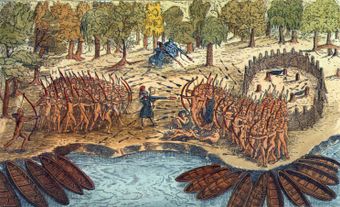
Sovereign Council
Sovereign Council In early NEW FRANCE a governing council was created, comprising the GOUVERNEUR (governor), the bishop and representatives ("syndics") of Québec, Trois-Rivières and Montréal. In 1663 Louis XIV equipped the colony with a complete administrative system modelled on those used to govern French provinces. The Sovereign Council, which in 1703 became the Superior Council, was comparable to the parlements of those provinces.The council initially comprised the governor, the bishop, the INTENDANT and 5 councillors. In 1703 membership grew to 12, to which 4 associated judges were added in 1742. Members, usually recruited from the French gentry, were nominated initially by the governor and the bishop and later by the king.
The council acted also as a court of appeal for civil and criminal matters originating in the lower courts. Its decisions could be reversed only by the King's Council, under which a judicial structure was established in each government of the colony: the provost marshal of Québec City (1663), the royal courts of Trois-Rivières (1665) and Montréal (1693), and the Admiralty (1703). The council also played an administrative role in regulating trade and public order, in registering the king's edicts, ordinances and commissions, and in promulgating them in the colony. After the CONQUEST of 1760 its appeal-court functions were taken over by a board of British military officers.

 Share on Facebook
Share on Facebook Share on X
Share on X Share by Email
Share by Email Share on Google Classroom
Share on Google Classroom

